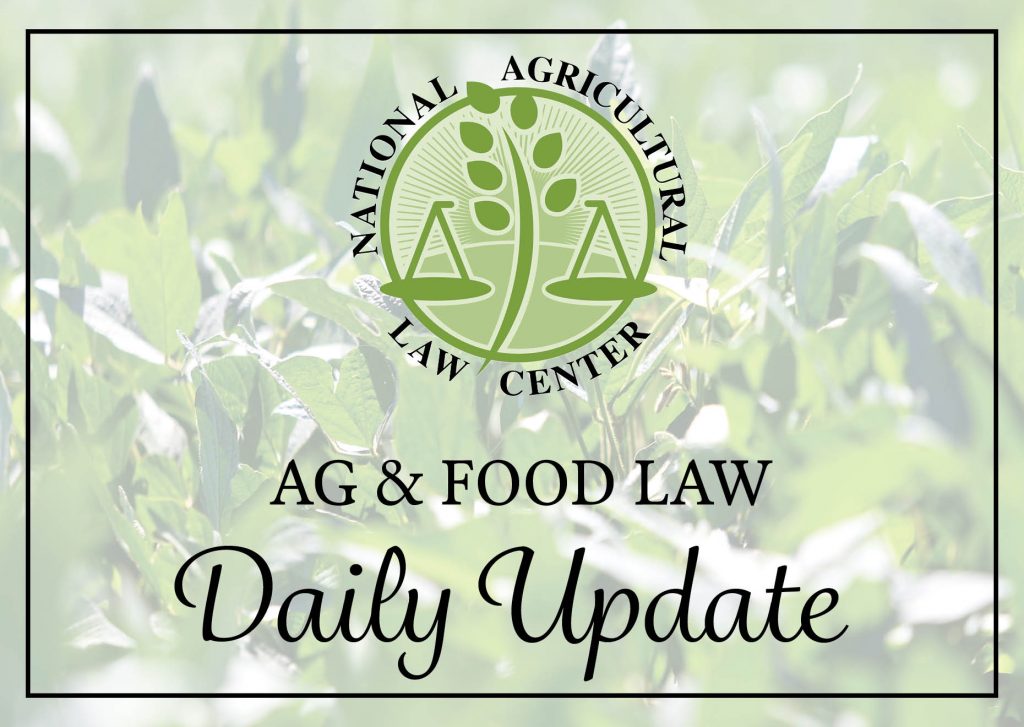A comprehensive summary of today’s judicial, legislative, and regulatory developments in agriculture and food. Email important additions HERE.
JUDICIAL: Includes CWA, state water quality standards
In Matter of NPDES/SDS, No. A18-2094, 2019 WL 6691515 (Minn. Ct. App. Dec. 9, 2019), the Minnesota State Court of Appeals considered multiple challenges to a National Pollutant Discharge Elimination System/State Disposal System (“NPDES/SDS”) permit that was issued by the Minnesota Pollution Control Agency (“MPCA”) to United States Steel Corporation (“U.S. Steel”). The permit was issued pursuant to the Clean Water Act (“CWA”) and governs discharges of pollutants to surface waters and groundwater from U.S. Steel’s Minntac ore processing operation. The case consolidated several different challenges to the permit from multiple parties. U.S. Steel challenged the groundwater conditions of the permit and MPCA’s denial of its requests for a variance from groundwater-quality standards. WaterLegacy and Fond du Lac Band of Lake Superior Chippewa (“the Band”) challenged MPCA’s interpretation of the CWA, arguing that the permit was not sufficiently protective of area surface waters. Ultimately, the court concluded that MPCA did not violate the CWA in determining that the Act does not govern discharges of pollutants into groundwater. However, the court also held that MPCA did misinterpret the state administrative rules governing water-quality standards. Accordingly, the court reversed the decision to issue the permit and remanded the matter back to MPCA for further proceedings.
In Minnesota, MPCA is the regulatory authority that has the responsibility to issue federal NPDES permits and state SDS permits in order to protect the state’s waterways. MPCA must issue those permits it accordance with both state and federal law. The permit at issue in this litigation regulated U.S. Steel’s discharges into both surface and groundwaters. MPCA chose to regulate U.S. Steel’s groundwater discharges through the SDS permit only because it interprets the federal CWA as not governing discharges into groundwater. WaterLegacy and the Band challenged that interpretation, arguing that the CWA does govern discharges into groundwater. The court agreed with MPCA, and found that the language of the CWA was ambiguous and open to multiple interpretations. The court concluded that because the text of the CWA was open to multiple interpretations, it was reasonable for MPCA to read the Act as only regulating discharges of pollutants into navigable waters, not groundwaters. Therefore, the court would defer to MPCA’s decision to not regulate U.S. Steel’s groundwater discharges via the federal NPDES permit.
Next, the court considered whether MPCA erred in setting conditions related to groundwater quality in the SDS portion of the permit. U.S. Steel argued that MPCA had misinterpreted state water quality standards and applied the wrong standards to the groundwater portion of the SDS permit. Ultimately, the court found for U.S. Steel. In looking at the water quality standards the MPCA had applied to the groundwater portion of the SDS permit, the court found that the standards unambiguously did not apply to groundwater. Accordingly, the court held that MPCA erred in issuing the permit and remanded it back to the agency for further proceedings.
REGULATORY: Includes FWS, NOAA
FISH AND WILDLIFE SERVICE
Notice of availability of an application from Copenhagen Wind Farm, LLC, for an incidental take permit under the Endangered Species Act. Info here.
NATIONAL OCEANIC AND ATMOSPHERIC ADMINISTRATION
Advanced notice of proposed rulemaking for a control date of December 10, 2019, that may be used as reference date for a future management action to limit future access to the Bering Sea and Aleutian Islands Pacific cod pot catcher/processor sector. Info here.
